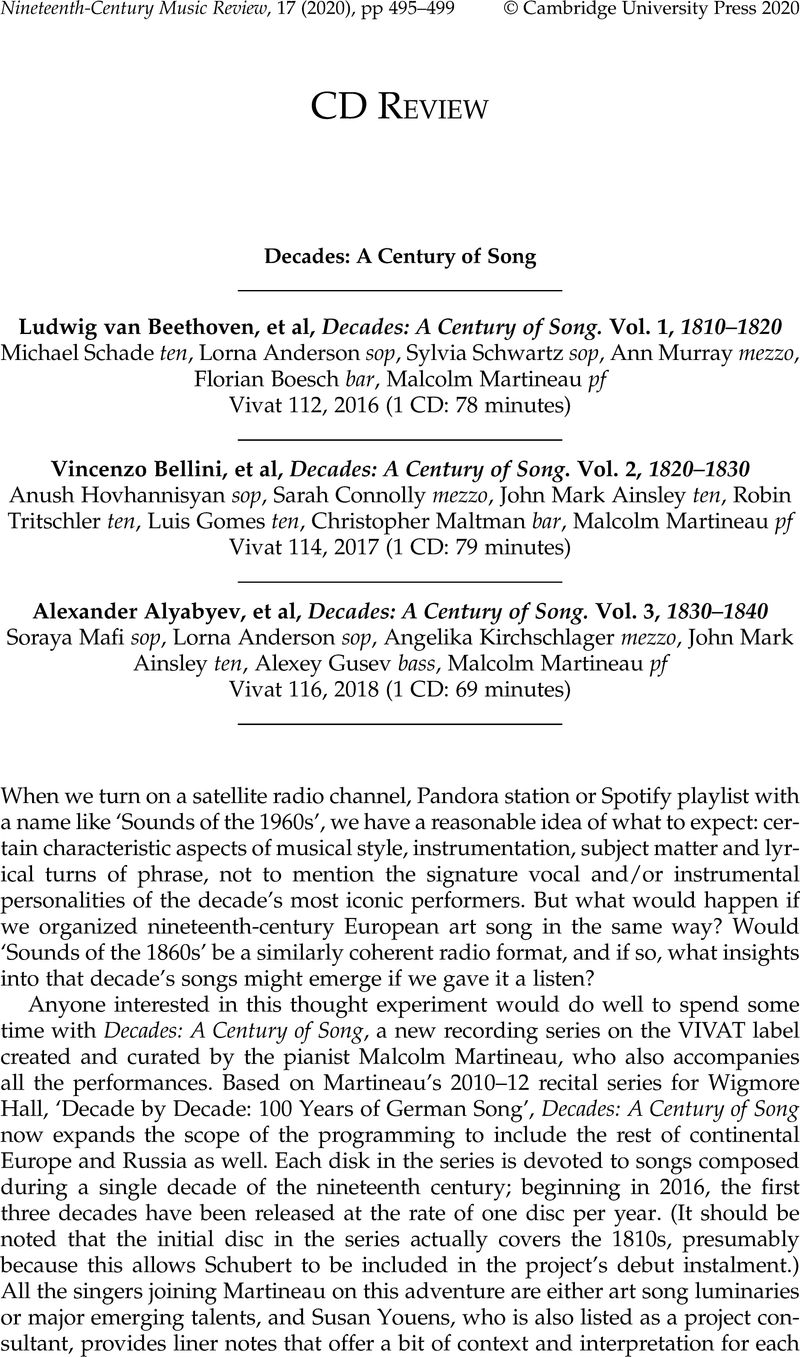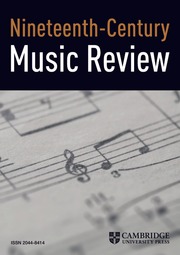No CrossRef data available.
Article contents
Decades: A Century of Song - Ludwig van Beethoven, et al, Decades: A Century of Song. Vol. 1, 1810–1820 Michael Schade ten, Lorna Anderson sop, Sylvia Schwartz sop, Ann Murray mezzo, Florian Boesch bar, Malcolm Martineau pf Vivat 112, 2016 (1 CD: 78 minutes) - Vincenzo Bellini, et al, Decades: A Century of Song. Vol. 2, 1820–1830 Anush Hovhannisyan sop, Sarah Connolly mezzo, John Mark Ainsley ten, Robin Tritschler ten, Luis Gomes ten, Christopher Maltman bar, Malcolm Martineau pf Vivat 114, 2017 (1 CD: 79 minutes) - Alexander Alyabyev, et al, Decades: A Century of Song. Vol. 3, 1830–1840 Soraya Mafi sop, Lorna Anderson sop, Angelika Kirchschlager mezzo, John Mark Ainsley ten, Alexey Gusev bass, Malcolm Martineau pf Vivat 116, 2018 (1 CD: 69 minutes)
Review products
Published online by Cambridge University Press: 08 January 2020
Abstract

- Type
- CD Reviews
- Information
- Nineteenth-Century Music Review , Volume 17 , Special Issue 3: The Experience of Listening to Music in the Nineteenth Century , December 2020 , pp. 495 - 499
- Copyright
- Copyright © Cambridge University Press 2020
References
1 Jeffrey, Brian, Introduction to Fernando Sor: Seguidillas for Voice and Piano or Guitar, ed. Jeffrey, Brian (London: TECLA Editions, 1976)Google Scholar, available online at https://tecla.com/fernando-sor/sor-seguidillas-introduction-by-brian-jeffery.
2 For an analysis of ‘Wonne der Wehmut’ along these lines, see Kinderman, William, Beethoven (Oxford: Oxford University Press, 1995): 140–45Google Scholar.
3 The liner notes attribute the text of Bellini's ‘Vanne, o rosa fortunata’ to Metastasio, but there is no evidence I can find to confirm Metastasio's authorship. Instead, the author was almost certainly Davide Bertolotti, a journalist, editor, poet and historical novelist who published the poem under his own name in his magazine Lo spettatore italiano in 1817. See Lo spettatore italiano 8/2 (1817): 70. Bellini resided in Milan in the late 1820s when these ariettas were composed, and he may have met Bertolotti at that time.
4 Méry's dedication can be found in his Poésies Intimes: Mélodies (Paris: Michel Lèvy Frères, 1864): 118. Taglioni had also been the star of the ‘ballet of the nuns’ in Meyerbeer's Robert le diable in 1831.
5 See Weaver, Anne Marie, ‘The Soprano and the Nightingale: Aleksandr Alyabyev's “Solovey”’, Journal of Musicological Research 35/1 (2016): 23–44CrossRefGoogle Scholar.
6 Lewin, David explores both settings along these lines in Studies of Music with Text (Oxford: Oxford University Press, 2006)CrossRefGoogle Scholar; see Chapter 6, ‘Ihr Bild’ (135–52), and Chapter 7, ‘Clara Schumann's Setting of “Ich Stand”’ (153–60).
7 See Frisch, Walter, ‘Schubert's “Nähe des Geliebten” (D. 162): Transformation of the Volkston’, in Schubert: Critical and Analytical Studies, ed. Frisch, Walter (Lincoln: University of Nebraska Press, 1986): 175–99Google Scholar.
8 On Vogl's performance style, see Tassel, Eric van, ‘“Something Utterly New”: Listening to Schubert Lieder. 1: Vogl and the Declamatory Style’, Early Music 25 (1997): 702–14CrossRefGoogle Scholar, and Dürr, Walther, ‘Schubert and Johann Michael Vogl: A Reappraisal’, 19th-Century Music 3/2 (1979): 126–40CrossRefGoogle Scholar.
9 Brigitte Fassbaender and Cord Garben, Carl Loewe: Lieder; Frauenliebe op. 60, Deutsche Grammophon 445575-2, 1988. For a recent account of Loewe's performance practices as a singer, see Chapter 3 (‘Carl Loewe's Performative Romanticism’) of Gooley's, Dana Fantasies of Improvisation: Free Playing in Nineteenth-Century Music (Oxford: Oxford University Press, 2018), 116–53CrossRefGoogle Scholar.




